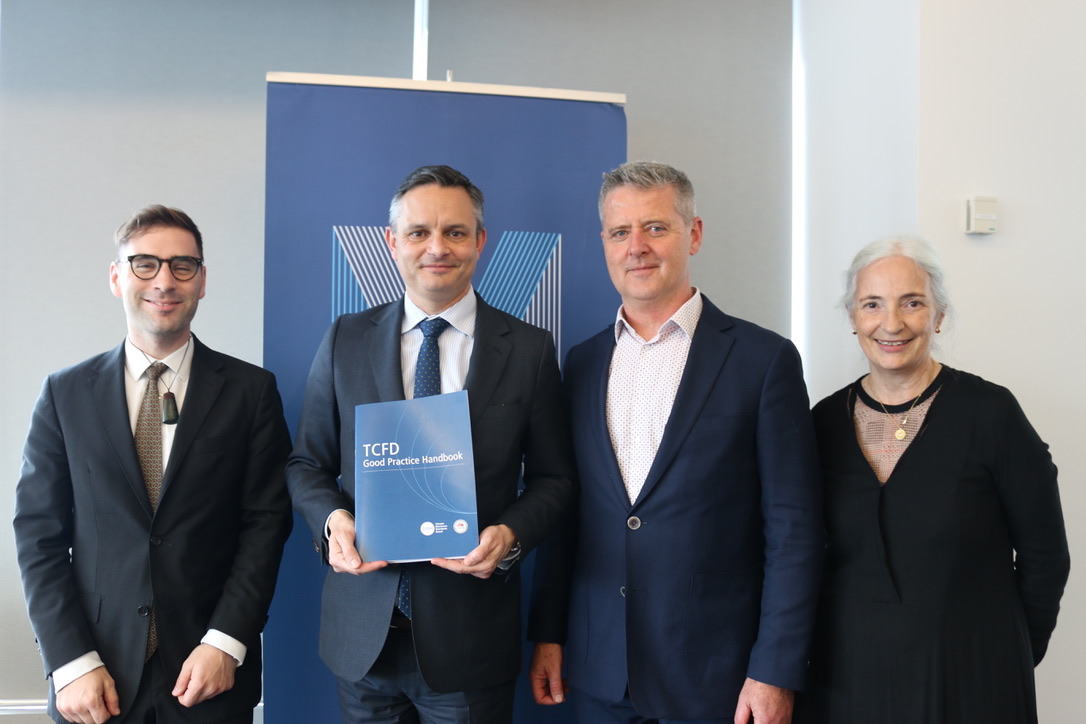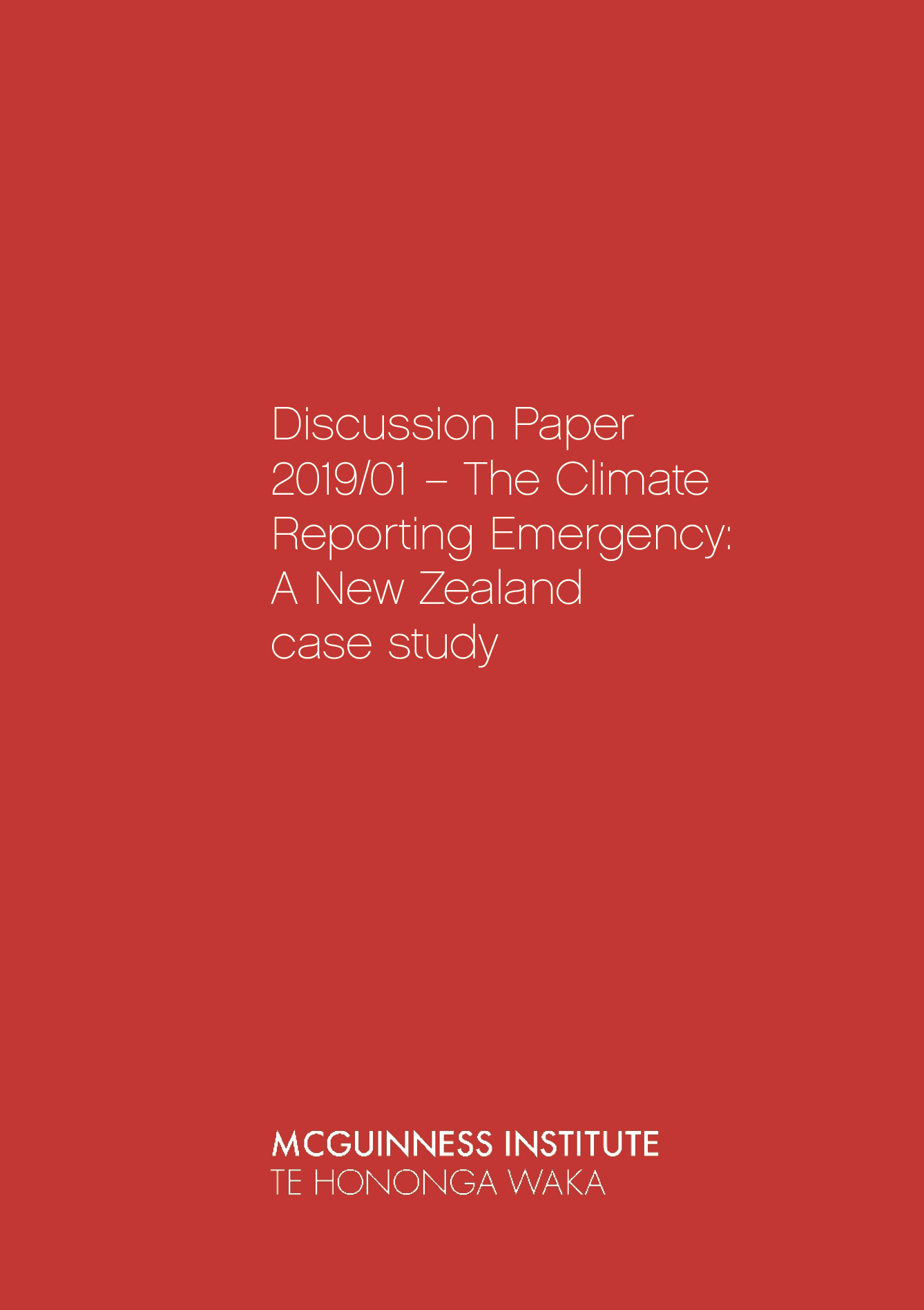On Wednesday 16 October and Thursday 17 October, the Institute partnered with Simpson Grierson to host two workshops exploring the Recommendations of the TCFD in Auckland and Wellington. The Institute was grateful for the expertise of Michael Zimonyi from the Climate Disclosure Standards Board (CDSB), who came over from Germany to lead the workshops.
The sessions were intended to give attendees a practical overview of the TCFD recommendations from an implementation perspective. This necessarily involved some broad context setting, which was provided at the Wellington workshop by Hon James Shaw, Minister for Climate Change, who spoke about New Zealand policy settings for climate reporting and gave an indication of the Government’s current thinking around these issues. Nick Wilson, partner at Simpson Grierson, opened the Auckland workshop with a mihi whakatau and the context setting was provided by McGuinness Institute Chief Executive Wendy McGuinness, whose presentation is available below.
With the New Zealand context set, Michael was then able to provide an overview of the core elements of the TCFD, touching on some of the challenges of reporting against the framework and introducing the TCFD Good Practice Handbook. The Handbook was published by the CDSB and the Sustainability Accounting Standards Board (SASB) to provide a basis for capability development of TCFD disclosures. The Institute was pleased to be able to offer complimentary copies of the Handbook at the workshops, which was the official New Zealand launch of the publication.
The bulk of the rest of the workshops was a deep dive into each of the core elements of the TCFD framework (see Michael’s presentation below), with questions that opened new avenues of discussion throughout the day. The detailed exploration of Core Element 2 (Strategy) was supported with a workshop exercise where attendees explored a variety of scenarios based on climate change models of representative concentration pathways (RCPs) for 2.6, 6.0 and 8.5. In the second part of the exercise, attendees practiced testing existing climate change and business strategies of New Zealand organisations against each of the scenarios and then making corresponding TCFD disclosures. See exercise here.
Just before lunch, we were joined by Professor Tim Naish from the Antarctic Research Centre at Victoria University of Wellington, who generously made himself available to answer any of the more scientific questions that had been raised throughout the day. His presentation is available below.
Over the lunch break, attendees had the option of sitting in on a video conference presentation from London-based Dr David Rubens, the CEO of Deltar Training Solutions Ltd and Executive Director of the Institute of Strategic Risk Management. Dr Rubens discussed some of the business issues more related to governance and risk management. We will update this blog as we receive material from David’s presentation to publish.
Climate change adaptation consultant Ian Edwards then contributed his insights via video conference from Queensland. Ian provided an academic perspective, giving a brief summary of concerns raised in academic literature about the underlying premises of the TCFD recommendations. Ian’s presentation is available below.
The final session of the workshop was a panel discussion and further Q & A opportunities.
In Auckland, Kirk Hope, Chief Executive of BusinessNZ, and Michele Embling, Chair of both the External Reporting Board (XRB) and PwC, joined Simpson Grierson Special Counsel Mark Baker-Jones to share their relevant expertise and the current thinking of their respective organisations about the likely future of the TCFD recommendations in New Zealand.
In Wellington, panelists were Ann Smith, CEO of Enviro-Mark Solutions, Christina Hood, Special Adviser on Climate Change from the Reserve Bank of New Zealand and Kimberley Crook, Chair of the New Zealand Accounting Standards Board (NZASB).
Wendy McGuinness, Chief Executive of the McGuinness Institute, chaired each of the panels, bringing in insights from Mark Baker-Jones and Michael Zimonyi as required.
Michael then offered some final takeaways, followed by Wendy, who formally closed the workshop. In Wellington, attendees stayed behind for refreshments and the opportunity to network with Hon James Shaw, who returned to answer any more questions that had come to mind over the day.
On behalf of the Institute, we would like to thank all our speakers for sharing their knowledge, particularly Hon James Shaw for giving up his valuable time, and Michael Zimonyi for coming such a long way to join us.

Michael Zimonyi, Hon James Shaw, Mark Baker-Jones and Wendy McGuinness after the Wellington workshop
Thank you also to everyone who attended one of the workshops; we look forward to a rich and ongoing conversation about how we can address the climate reporting emergency in New Zealand.
We also owe a significant debt of gratitude to the staff of Simpson Grierson for their event management and administrative support, as well as our own McGuinness Institute staff.
Background to Project ReportingNZ
The aim of Project ReportingNZ is to contribute to a discussion on how to build an informed New Zealand. This year, the Institute’s work in this project has been shaped by the alarming state of climate reporting within New Zealand. Most recently, this work has culminated in the publication of Discussion Paper 2019/01 – The Climate Reporting Emergency: A New Zealand case study.
We have a number of next steps for this project:
- Report 17 – ReportingNZ: Building a Reporting Framework Fit for Purpose. This Project 2058 report aims to lay the groundwork for a review of New Zealand’s reporting framework. Such a review would have the end goal of improving New Zealand’s information infrastructure, making it fit for purpose for both users and preparers by making information (especially climate-related information) useful, accessible, accurate, timely, cost-effective and comparable.
- Working Paper 2019/07 – A Review of the Accounting and Assurance of Greenhouse Gas Emissions. This working paper will attempt to answer a series of questions about emissions reporting as they relate to a range of international climate reporting regimes:
1. Who should report?
2. Where should this information be disclosed?
3. What methodologies should be used?
4. What GHG Protocol scopes (1–3) should be reported?
5. Should emission disclosures be assured? - Explore the idea of a New Zealand Green Finance Strategy. This would be along the lines of the UK Green Finance Strategy, which is discussed in more detail in Section 7.5 of Discussion Paper 2019/01 – The Climate Reporting Emergency: A New Zealand case study.
- TCFD Survey November 2019. This survey is intended to provide an insight into the experiences and expectations of New Zealanders interested in the recommendations of the Task Force on Climate-related Financial Disclosures (TCFD). It is open to both attendees of the workshops and to the general public.


